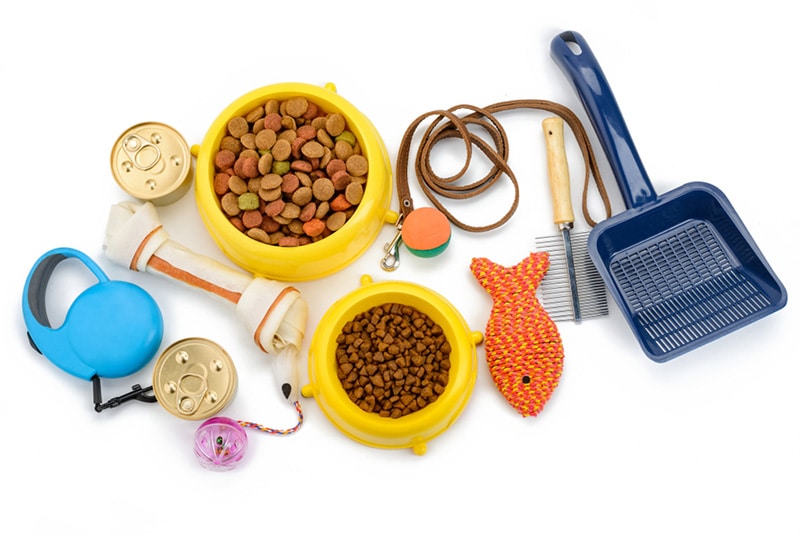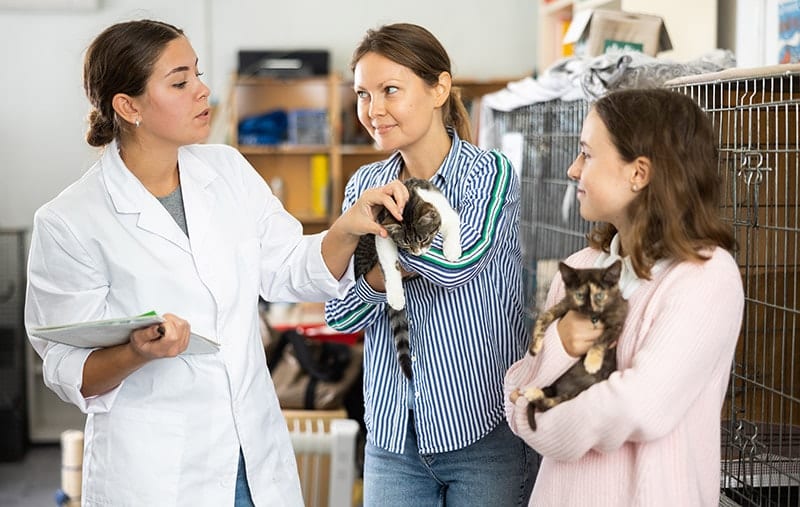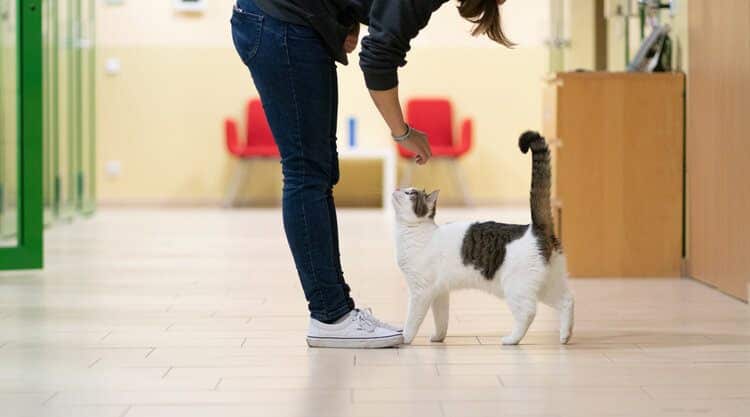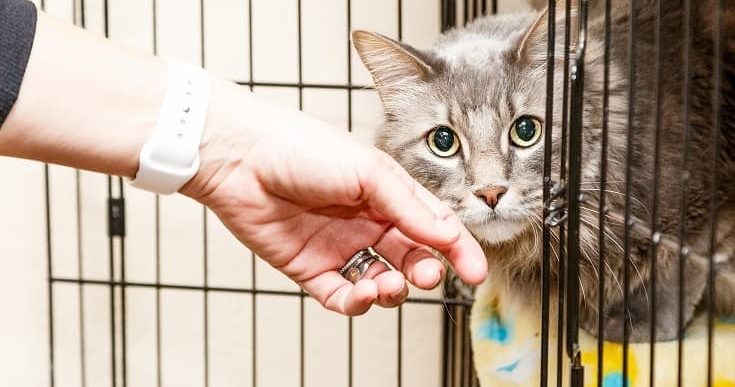You’ve decided you want to welcome a cat into your home, but you’re not sure how to get started. Adopting a cat is a wonderful experience, but it can be a nerve-wracking affair if you’re a newbie to pet ownership. Considering that a cat is a long-term commitment, it’s a good thing you’re here. In this article, we’ll delve into all the major aspects you’ll need to consider when choosing your perfect kitty to bring home.
Check it out below, right after a quick list of the supplies you’ll need.

Before You Begin
Before you start on your cat adoption journey, it’s essential to go shopping for essential supplies. While food, litter, and treats are recurring costs, most of the following items are one-time or long term purchases.
- Litter box
- Cat litter
- Travel carrier
- Food & water bowls
- Collar with ID tag & your contact information
- Scratching post/mat
- Cat food of choice
- Cat treats
- Pet bed
- Toys
- Pet wipes
- Pet shampoo
- Cat tree (optional)
- Cat shelves (optional)
Note: it’s best to start with the food your cat is used to in their shelter and slowly transition them to another food (if necessary).
That’s really all you need to bring your cat home for the very first time, and you don’t necessarily need to go all out with the fanciest products. You can start with the essentials and incorporate more toys, etc. later on. Now that you’re armed with your essential cat supplies, it’s time to discuss what to look for in an adorable cat before adopting. Read on for the details and consider jotting some of this down for later.


The 6 Things to Consider When Adopting a Cat
1. Kitten or Adult Cat: Which Should I Get?
Adult cats are typically easier to care for as a first-time pet owner than a kitten, but it depends on the type of companion you’re looking for. A kitten is a big commitment from day 1, and they don’t always have a fully formed personality like adult cats.
Kittens go through spurts of hyperactivity, may need help with litter training, and overall are more work. There is something truly beautiful about raising a kitten and watching their little identity blossom as they bond with you, but it may not be for everyone due to the rigors involved.
On the other hand, adult cats are typically neutered/spayed, have been vaccinated, and have a distinct temperament all their own. You likely won’t have to teach your mature cat how to use a litter box, and those with a history of being house trained are relatively quick to adapt to a new house. This makes adults a good choice for someone who isn’t used to cats and may not be confident in their ability to look after a kitten.
2. Investigate the Cat’s Health
When looking at adult cats, you should ask about their medical history. Broadly speaking, a clean, well-groomed cat with clear eyes and trimmed nails will be healthier than a malnourished cat with unkempt, dirty fur and painfully long nails.
Purebred cats are often predisposed to certain genetic risks (depending on their breed) and may be associated with more veterinary costs as a result of these risks.
Adult cats from rescue shelters are sometimes hit-and-miss on medical history, so we urge caution. If someone doesn’t want to talk about a cat’s medical history, won’t let you visit the facility, or the cat appears unwell, it’s a major red flag.

3. Ask About the Cat’s Background
You can tell a lot about a cat by where they come from. The tricky part is that many rescue kitties come from checkered, often abusive circumstances, and there are many strays or feral cats that may get mixed in, too.
- Ask about previous homes, if possible. Cats who grew up with children might make a good family cat, while a history of abuse may require more effort on your part to bond with the cat.
- What was the specific reason the cat was surrendered? Was it neglectful owners or something else that you should be aware of?
- Does the cat have special needs that will require additional veterinary expenses and at-home care?
- Is the cat litter trained?
- Does the cat have any major behavioral problems or quirks you should know about?
- Ask whether the cat is more outgoing, reserved, clingy, energetic, laidback, etc. It’s important the cat has a personality compatible with your lifestyle.
- Does the cat have any special dietary needs?
4. Assess the Cat’s Personality
You’ll need to meet with multiple cats before you get a handle on which you resonate with most. Is it the shy, sweet calico that prefers wet cat food? Maybe the forwardly affectionate tortoiseshell? Finding the right cat may take some patience, but we have tips that can help when you’re meeting cats.
- Look for a relaxed, easygoing posture
- Look for a cat that isn’t scared to approach you
- See if the cat enjoys physical contact with you

5. Consider Your Home Environment & Lifestyle
Think about what you’re really looking for in a cat when you go to meet kitties for the first time. Are you looking for a mellow companion with a short, low-maintenance coat, or do you prefer a more active, fluffy/furry family companion that’ll play games with you? To help you determine the type of cat that might fit your home, ask yourself the following questions.
- Do you have kids, and if so, how old are they? Younger children require more supervision around pets and may do better with a robust adult cat rather than a young kitten.
- Can you comfortably afford the recurring food and medical expenses a cat needs?
- Do you have other pets? Introducing new pets can be a challenging process when not approached carefully.
- Is your home safe for a pet? Think about any major hazards that could hurt your pet, like exposed electrical outlets or wiring.
- Do you have time to spend with your cat outside of work and your other commitments?
- Do you travel? Traveling cat owners need to pay for pet sitters and kennels and typically pay pet fees at hotels.
6. Let the Cat Choose You
If, after all our tips, you’re still having a hard time, let the cat choose you. Like people, sometimes, when you meet a cat, you feel an instant connection. That’s a pretty good sign you’ll be fast friends! We know we threw a lot of info at you above, but in the end, you should trust your gut instinct.
If a cat is grumbly and antisocial, it’s okay to meet other kitties. It’s better to wait for your perfect cat than to settle for one you won’t get along with. Once you bring your cat home, you should take things at their pace.
They’re in a new place and don’t know what’s going on. Give them time and space to acclimate to their new home and routine while maintaining a calm, loving presence. This can take days to weeks and possibly longer with some cats.


Conclusion
Choosing the right cat to adopt requires you to do your research on a cat’s history, personality, and health and think about whether they fit in well with your lifestyle. It’s also always a good idea to consult a vet about what you should know about a feline’s health & care before adopting your ideal kitty.
See also:
- My Cat Ate Ibuprofen: Is it Dangerous & What to Do? (Vet Answer)
- Abyssinian Maine Coon Mix: Pictures, Facts, Care & More
Featured Image Credit: BearFotos, Shutterstock








